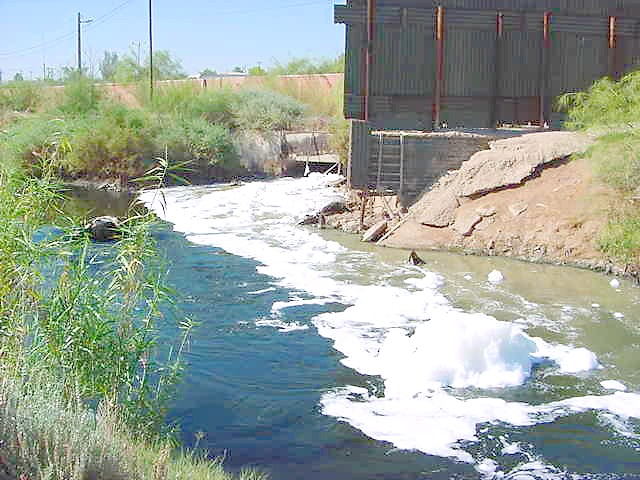This article is written by Ms. Mrinal Kanwar, lawyer (WBNUJS, batch of 2011) and an environment enthusiast. To read more articles, visit www.watchfulobserver.com
Is the factory next door polluting your drinking and bathing water?
Is your and your family’s health suffering because of using that water?
Are you sick of the stench in the area around your house?
Do you want to take any action against the factory owners?
We are all victims of water pollution in some or the other way. In most areas surrounded by industries, the presence of toxic matter in drinking water is much higher than permissible limits. The levels of toxicity depend on the nature of pollutants. For instance, Mercury is known to cause damage to functioning of the brain, cause other neural disorders, reproductive abnormalities, abortions, obstruction of growth in children and disruption of the gastrointestinal system; pesticides are carcinogenic and fluorides lead to bone deformities.
The government has enacted various environmental laws for dealing with problems of water pollution. These laws provide a mechanism through which citizens like you and I suffering at the cost of these industries may bring to the notice of the authorities instances of pollution and violation of environmental laws to get respite.
Who are these authorities?
The Central Pollution Control Board (‘the CPCB’) established under the Water (Prevention and Control of Pollution) Act, 1974 (‘the Water Act’) is a statutory organization under the Ministry of Environment and Forests. The CPCB along with its equivalents State Pollution Control Boards (‘the SPCBs/the Boards’) are entrusted with the responsibility for execution of environmental legislations relating to prevention and control of pollution.
The Complaint Procedure
Complaints regarding water pollution can be made to the regional office or the head office of the SPCB or to the State Government. Every state has a head office in the state capital and regional offices in all major districts in the state. There are certain matters in which the authority lies with the District Collector or the Municipal Corporation, depending on the laws they are implementing. In such cases, the right forum will be those authorities to deal with such matters.
A citizen can contact the regional office of the SPCB to report a case of pollution of water by an industry under section 24, 25 and 26 of the Water Act. Once the complaint is recorded, the Board will inspect the facts alleged in the complaint, take samples of the water from the polluted area, send them for analysis and examine the results.
If the results are positive, the Board has the power to direct ‘the closure, prohibition or regulation of any industry, operation or process; or order the stoppage or regulation of supply of electricity, water or any other service’ to the polluting unit, under section 33-A of the Water Act. The Board also has the power to withdraw the consent of operation granted to the polluter under section 27 of the Water Act. The Board can also file a criminal complaint to a Metropolitan Magistrate or a Judicial Magistrate of the first class, against the polluting unit, under sections 43 and 44 of the Water Act (penalty provisions) for violation of the provisions of section 24, 25 and 26 of the Water Act. The punishments prescribed under the Water Act range between one and half years to seven years.
In case the Board does not take any action on the complaint, the aggrieved citizen can knock at the doors of the Indian judiciary after giving a mandatory 60 days notice (in the manner prescribed in the Water Act) to the Board or the authorized officer. No court inferior to that of a Metropolitan Magistrate or a Judicial Magistrate of the first class will try any offence under the Water Act.
What to do in case of an Emergency?
In case of a situation where the conduct of any business is hazardous to the health or physical comfort of the community requiring such a polluter to immediately stop its functions, the aggrieved citizen can file a complaint with the District Magistrate or the Sub-Divisional Magistrate or any other Executive Magistrate (empowered by the State Government for this purpose) under section 133 of the Criminal Procedure Code, 1973. The Magistrate may immediately make a conditional order requiring the polluting unit to desist from carrying on such activities or regulate its functions in the manner prescribed. The polluter is given an opportunity to show cause as to why the conditional order should not be made absolute.
Other provisions
An aggrieved citizen can also approach the Courts by filing an FIR or initiating complaint proceedings against the polluter under various provisions of the Indian Penal Code, 1860 (‘the IPC’). Section 277 makes fouling of water of public springs and reservoirs an offence (punishable with imprisonment upto 3 months) and Section 284 makes a person who is handling poisonous substances in a negligent manner so as to endanger human life criminally liable (punishable with imprisonment upto 6 months).
Word of Caution
The overall experience dealing with pollution control boards may not be too pleasant, as these watchdogs do not have teeth to punish polluters. Most complainants have experienced that these pollution control boards are normally reluctant to deal with lawbreakers and are mostly ineffective at implementing the environment protection and anti-pollution laws. Therefore, one’s best bet then is to make a formal complaint with the pollution control board, wait for it to not respond, serve a sixty day notice on the Board and then make a complaint to the Court. That said, the cumbersome bureaucratic set up should not deter us citizens from fighting for our rights, our future and the health of our families.
For any further assistance regarding filing a complaint or understanding/ executing paperwork in this regard, please feel free to drop in a request at [email protected]
 Serato DJ Crack 2025Serato DJ PRO Crack
Serato DJ Crack 2025Serato DJ PRO Crack









 Allow notifications
Allow notifications


